What I Learned at Seattle WorldCon
Musings from a Writer Who Forgot His Own Advice
I just returned from Seattle, where I attended WorldCon (the World Science Fiction Convention), a gathering point for thousands of fans and professionals in sci-fi and fantasy. This was my second WorldCon, and while I knew what to expect this time around, it still felt like entering a different world.
Funny story: at one event, a few writers came up to me and asked if I was the person who had written a blog post about how to prepare for WorldCon. Honestly, I had forgotten I had written that post until they jogged my memory. They seemed to remember more about my own writing than I did!
Had I re-read my own blog before traveling, I probably would have been better prepared. Alas, it was a reminder that our words can carry farther than we realize. And since people found that piece useful, here I am again, writing another reflection.
A Lot Can Happen in a Year
Since my first WorldCon in Glasgow, life has…well, lifed. I got my rights back to Deficient after my former publisher closed. I moved from Geneva back to the US after getting impacted by DOGE (more on that here). I tend to respond to rockiness by writing more, and a lot of words came out of me this year. I started this Substack. I wrote a novelette and a short story. Advanced on the fourth and final novel in the Deficient series. Revised books two and three. Re-entered the query trenches. Soon I’ll be starting a new job as executive director of a literary nonprofit.
It’s easy to slip into the mindset that we haven’t accomplished, achieved, or arrived—one of those blood pressure-raising A-words. But when we pause and take stock, we usually find that far more has happened than we give ourselves credit for. We take hits, stumble, and fall. Some projects move forward, others stall, and a few surprise us entirely. Sometimes life takes over and the art has to wait, or the word counts don’t land where we hoped. Life is messy. That’s its nature. No matter where we are, it’s okay.
Signing Up Last Minute
I’ll be honest, I signed up late for Seattle WorldCon because of other life commitments. That meant missing out on the chance to panel, but that was okay. My main goal this time around was simply to connect with other writers and soak in a community that I still feel very new to and am still finding my place in.
Knowing what you want from WorldCon makes a big difference, as that will shape your time and conversations. For me, it meant leaning into community spaces, authors whose work I was less familiar with, smaller panels, and meetups.
Seattle: A City of Contrasts
It had been more than a decade since I last visited Seattle. Some things felt the same. The salmon at Pike Place is still out of this world, the skyline is still gorgeous, the rain a likely occurrence. But other things hit hard: the visible poverty, open fentanyl use, and the stark racial and socio-economic inequalities on the streets. It’s impossible not to notice. The contrast between the shiny convention center and what was happening just outside it was jarring.
I don’t say that to cast gloom over the event, but because it feels important to acknowledge. We can’t fully celebrate a genre built on imagining futures if we ignore the inequities right in front of us in our present realities.
Community in Action
One of the best things about WorldCon is that it’s not just about the headliners. For me, it was all about community.
SFWA Gatherings & Author Readings: The Science Fiction & Fantasy Writers Association hosted networking events that brought together writers at every stage, including those nervously querying their first book, veterans with multiple series under their belt, and everyone in between. I also reconnected with familiar faces from past Nebula conferences and had the treat of hearing writers like Erik Grove and David D. Levine read their work. Their prose was nothing short of delicious.
Latinx Meetup: This was a standout. Folks from the US, Latin America, Brazil, Spanish-speaking and Portuguese-speaking communities, all wrestling with questions of identity. What does it mean to be Latinx/Latine/Latino/Latina/Hispanic/Lusophone? We talked about imposter syndrome, double colonization, fears in the current political climate, and the lack of representation of indigenous voices. It was powerful to have that space, and I’m grateful to Ben Francisco (author of Val Vega) for organizing it in such a thoughtful and inclusive way.
MG & YA Connections: I had the chance to meet middle grade and young adult authors, attend panels on developing “YA squads” and crafting characters, and connect with writers like Diana Ma (whose latest YA novel, Force of Chaos, is about Trini Kwan, the yellow ranger—so cool!), Michelle Knudsen (author of Into the Wild Magic), Donna Barba Higuera (author of The Last Cuentista), Paul Michael Winters (author of The Haunting Between Us), and M.T. Zimny (author of The Apex Cycle trilogy, which is part of the same superpower constellation as my own work). There’s a real push to reinvigorate the MG/YA community in SFWA, and I find that exciting.
Queer Meetups: The LGBTQIA+ gathering and panels were vibrant. Writers like Charlie Jane Anders, Annalee Newitz, and Darcie Little Badger reminded me of the sheer brilliance thriving in queer SFF right now.
Table Talks: I had the chance to meet Cody Sisco, a writer and editor who recently worked on one of my queer short stories. Spending quality time with an editor—asking questions, sharing insights, and simply connecting—was invaluable. It was also a reminder of just how essential editors are in helping our work shine. No matter how solitary writing can feel, we can’t do this work alone.
Strange Horizons Spotlight: A highlight was sitting in on a Strange Horizons podcast recording with Shiv Ramdas, who reflected on his first story with them, published in 2019. (If you haven’t read “And Now His Lordship Is Laughing,” I highly recommend it. The piece is a haunting exploration of the trauma of British colonization in India, and of survival and resistance in the face of it.) After the recording, the Strange Horizons team stayed for a meet-and-greet, and they couldn’t have been more approachable. You can learn more about their podcast here.
Top Tips for WorldCon
In the spirit of last year’s blog, here are some lessons learned from my time at WorldCon Seattle:
Remember the volunteers. WorldCon is run entirely by volunteers—unpaid fans who pour countless hours into making it happen. They were incredibly kind and welcoming. Don’t forget to thank them—or even ask how you can lend a hand (I ended up hauling heavy boxes on day one!). With an event this size, a few glitches are inevitable. Registration, for instance, was a bit chaotic, with long, winding lines that first morning. If you can, try registering the day before or wait until the rush dies down. Panelists and vendors are usually able to fast-track, as are attendees with accessibility needs.
Workshops & Table Talks. Sign-ups for practical workshops and table talks (small group chats with specific people) happened at a single computer at a volunteer table, and you had to register the day before the event. Later, you’d get an email letting you know if you’d made it in—or, in many cases, a blunt “Unsuccessful” email that was a little harsh, though it made me laugh. Sign up early if you can and leave it to the fates. That said, not all hope is lost if you don’t get in. I heard plenty of stories of people slipping into sessions anyway, and I did the same with Fran Wilde’s workshop on novel endings—a talk I especially wanted to hear as I’m in the process of wrapping up a four-book series.
Download the app early. Guidebook was the app of choice. Don’t wait until you’re in the registration line with bad Wi-Fi to download it, like I did! Once you have the app, you can build your schedule. The app was easy to navigate, and you could even search specific people to find what events they were in. The app has a few glitches and stalls when downloading. It’s best if you can screenshot your plan so you’re not at the mercy of poor connectivity.
Plan, but stay flexible. Make a rough schedule, especially for things requiring advance sign-up, but give yourself permission to bail when you’re tired. Remember: it isn’t possible to attend everything, and it’s important to build in breaks. Also, have a back-up plan in case you don’t get into the session/workshop you wanted.
Conference brain is real. At some point, or at multiple points, your social battery will die. It’s okay. Step outside, take a stroll, or retreat to a quiet space. Breaks are survival, and it’s okay to draw boundaries.
Ribbons. They’re a thing. People collect them and stick them to their nametags. I saw one lady who made an entire apron out of her ribbons. I’m not a ribbon person, but even I ended up with a small collection.
Books. You will buy them, especially when you meet lovely authors in person. I swore I wouldn’t because my to-be-read pile is already way too big. I came home with seven. Leave extra space in your bag. Also, if you’re looking for great reads, check out the Hugo Award finalists and winners.
Why It Matters
WorldCon isn’t just about brushing shoulders with the big names like George R. R. Martin, Martha Wells, and Brandon Sanderson, though you can do that if you’re patient and willing to wait in lines. It’s also about seeing yourself in the community, and finding your people, your stories, your inspiration.
It’s also about perspective. You probably won’t be landing an agent or a book deal (though if you do, congratulations and wow!), but you will leave with something arguably more valuable: renewed energy for your craft, fresh ideas, and new friends.
A Note on our Dystopian Reality
By the time WorldCon wrapped up, my brain felt like mush. I needed some time to decompress, so I slung my hiking backpack over my shoulders, another bag across my front, and wandered through Seattle on a gorgeous sunny afternoon. That’s when I came across a demonstration for Palestine. I stopped, listened to the speakers, and joined in. To be honest, I hadn’t heard much mention of Palestine or Gaza inside the convention—even in panels on dystopia, where the idea of hope came up frequently. Maybe we’re tired, maybe we’re jaded, but I believe it’s vital for writers to call injustices by name, including the ongoing genocide in Gaza. Hundreds of fellow writers and artists have already been murdered, and every child in Gaza has been impacted—whether through the loss of life, being wounded, going hungry, being displaced, or being denied education. We must stand in solidarity with them.
Those of us who imagine speculative futures and warn against dystopian realities have a responsibility to also call out the atrocities unfolding in our present. Marching alongside Seattleites demanding an end to the siege, the genocide, and the mass starvation—and calling for accountability from Israel, the U.S., and companies like the Boston Consulting Group, Microsoft, and Google—was, in many ways, one of the most powerful moments of the trip. It connected the imaginative work of the Con with the stark reality of some of humanity’s most monstrous impulses.
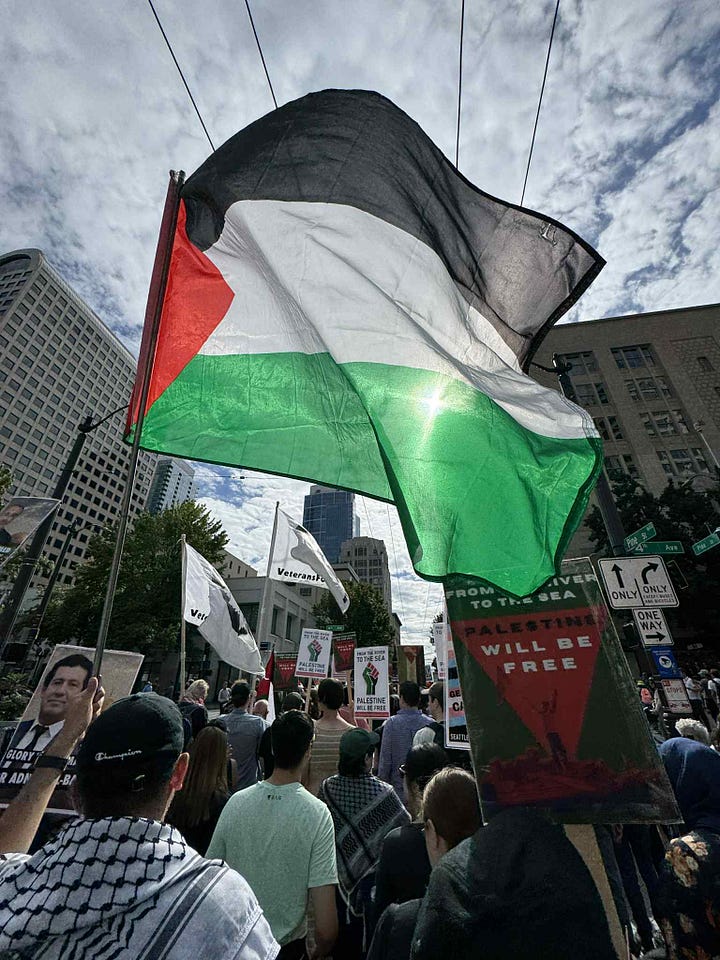
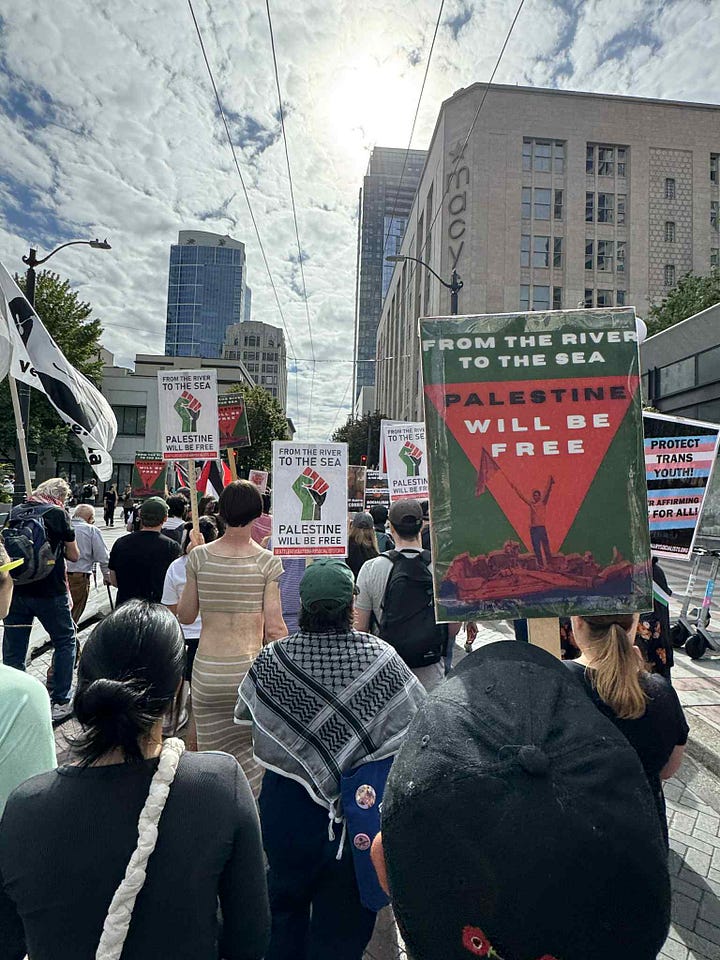
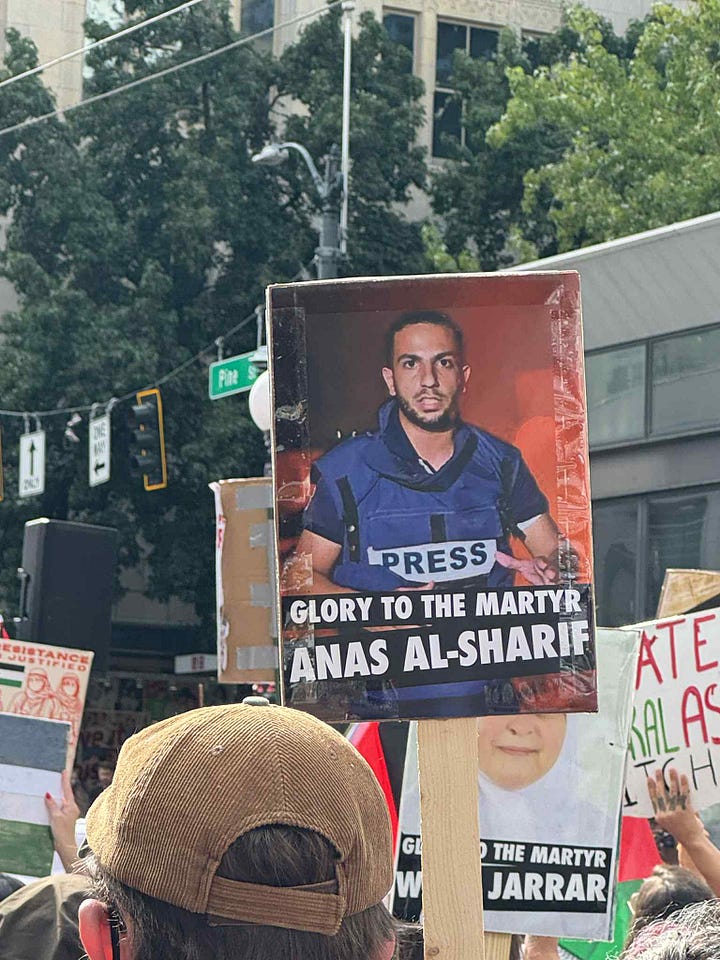
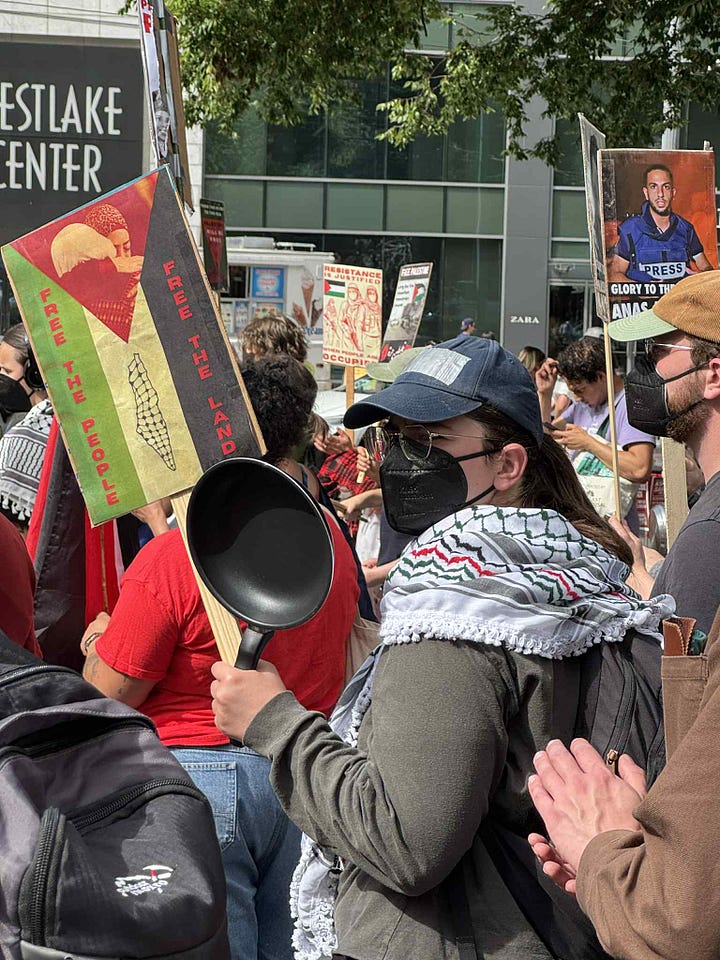
Taking Stock
If there is one thing I hope you take from this reflection, it’s the reminder to pause and take stock—of your life, your journey, and the context you’re living in. Whether or not you attended WorldCon, think about where you were a year ago. Think about the stories you’ve begun, the words you’ve managed to weave together, and the experiences that have shaped you. And don’t forget the privileges we hold, the rights we possess, the fragility of those rights, and the power of our collective voice.
Progress doesn’t always mean finishing a book. Sometimes it’s an idea scribbled in a notebook, a conversation at a con, or simply surviving a hard year and still showing up at the page.
And if you find yourself at the next WorldCon in Los Angeles, I hope these notes help you feel a little more prepared. As for me, I just hope I’ll remember that I wrote this post…and that I re-read it before the next go-round!



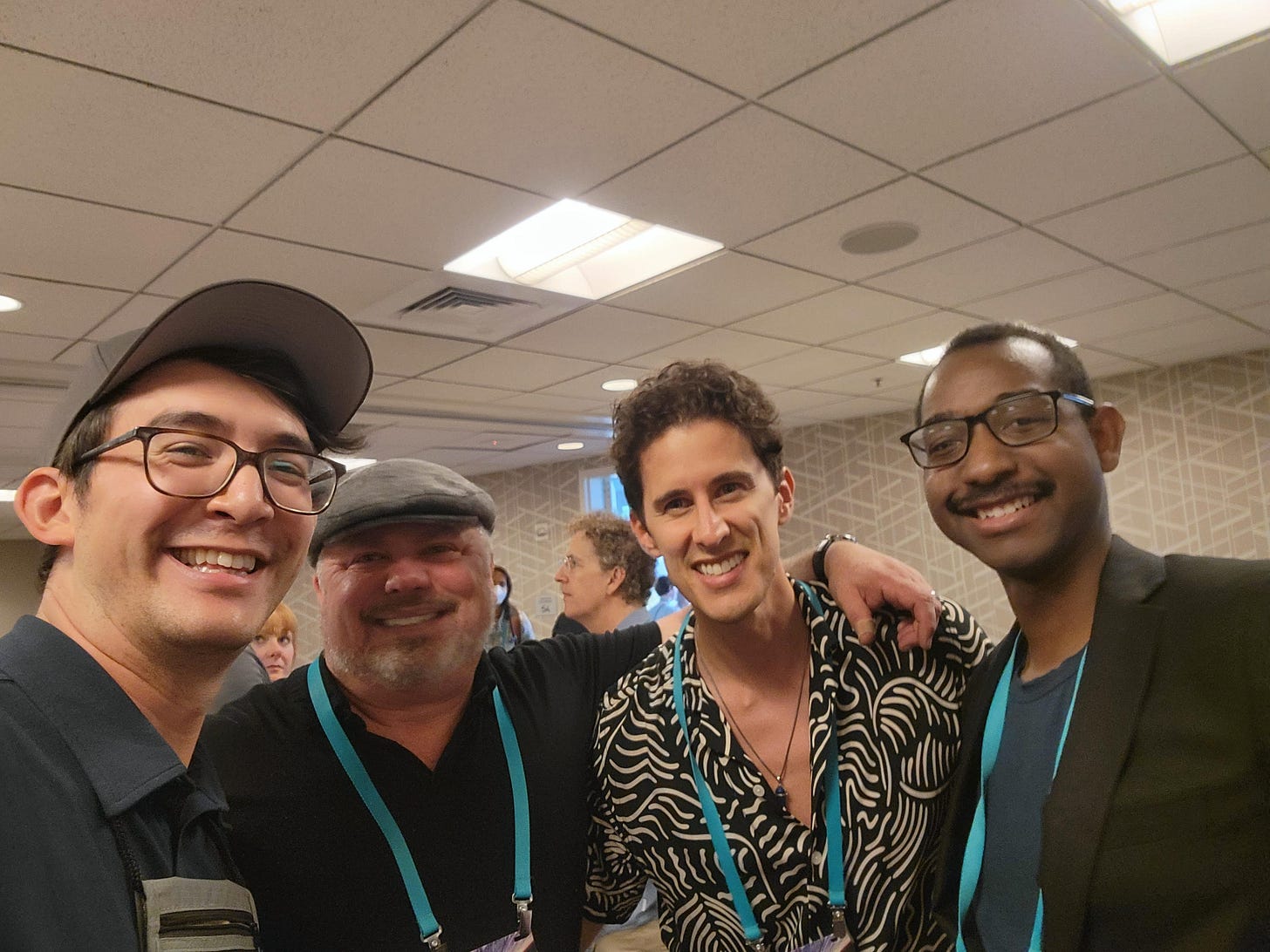
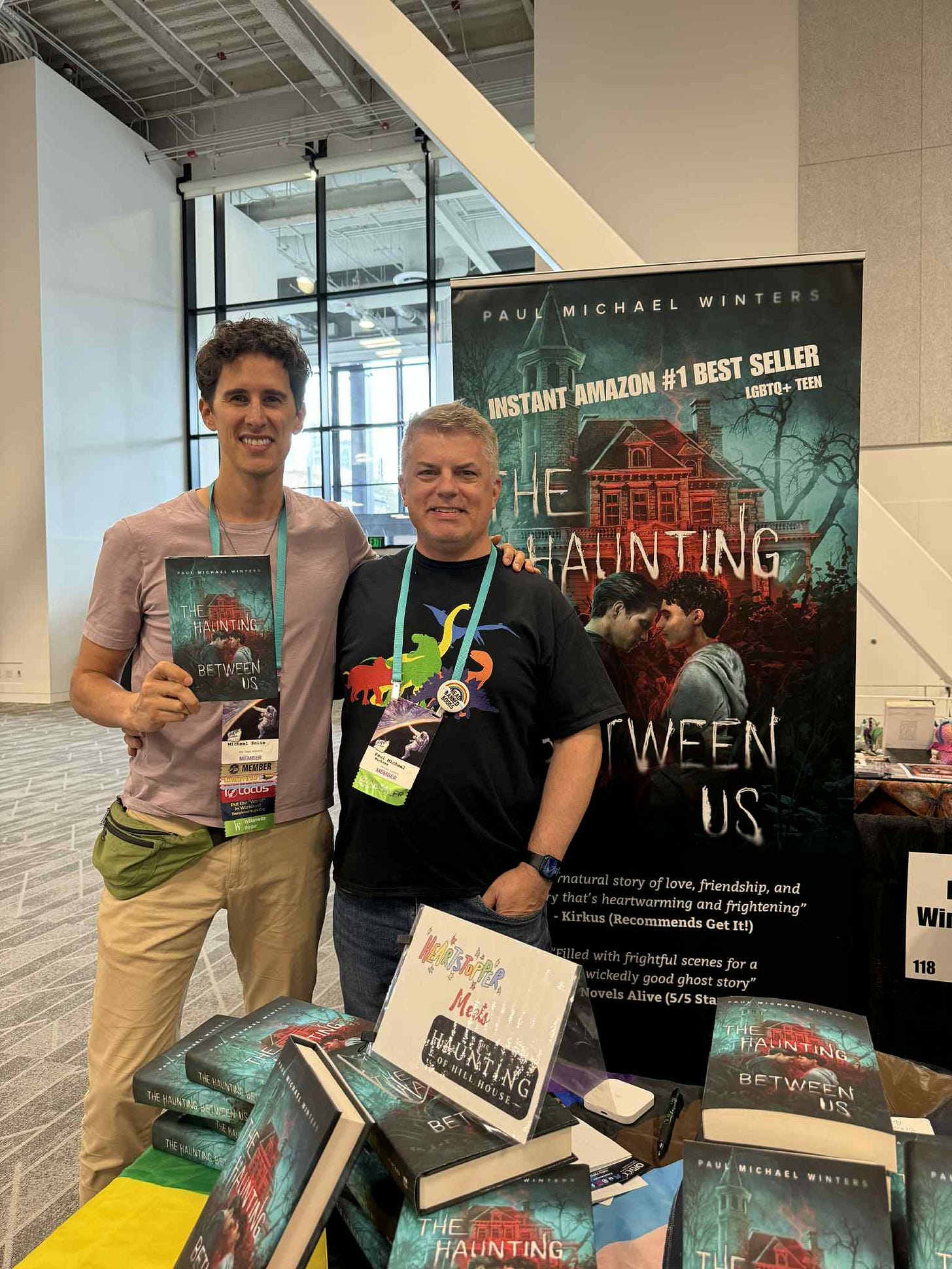
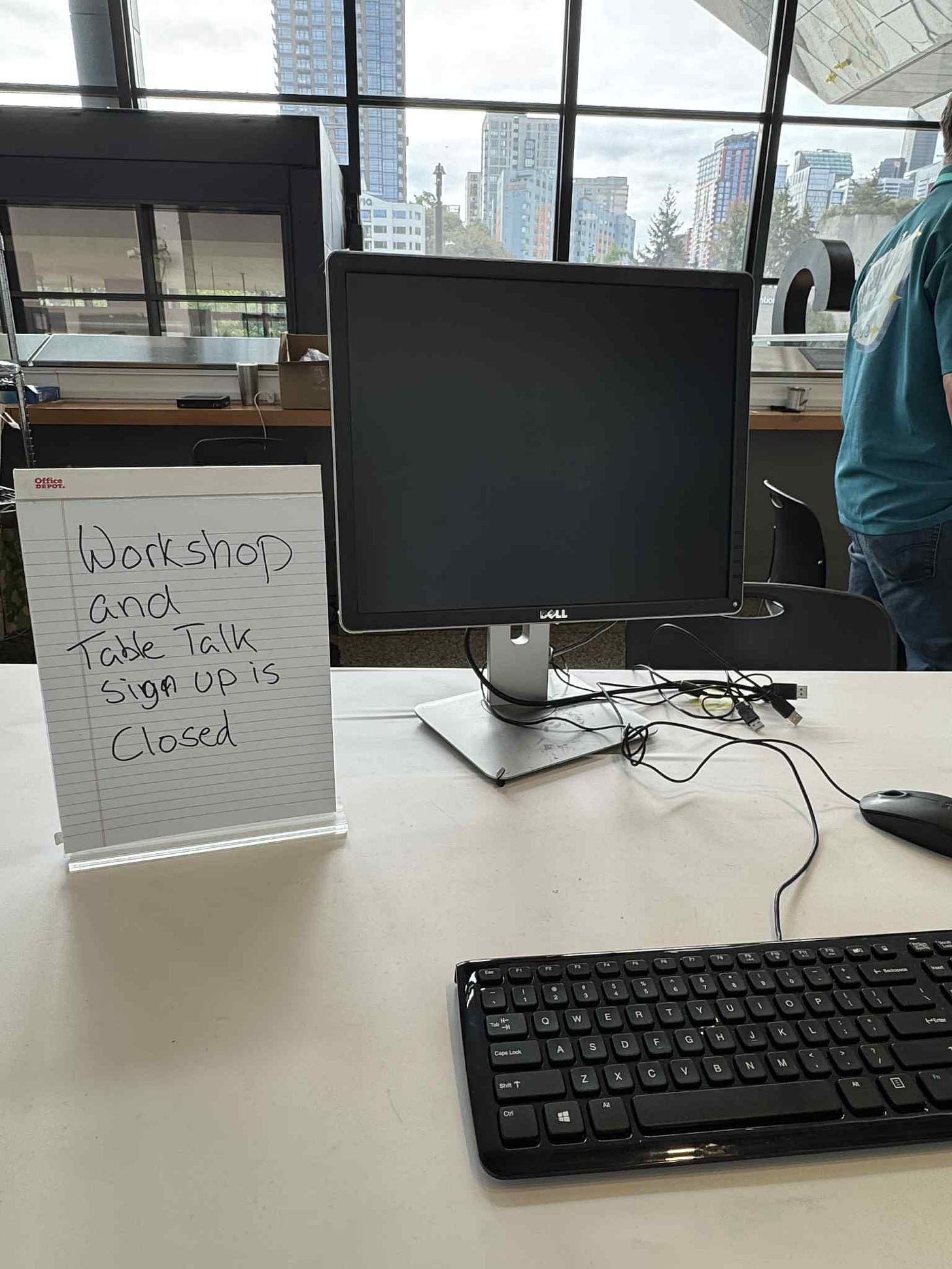
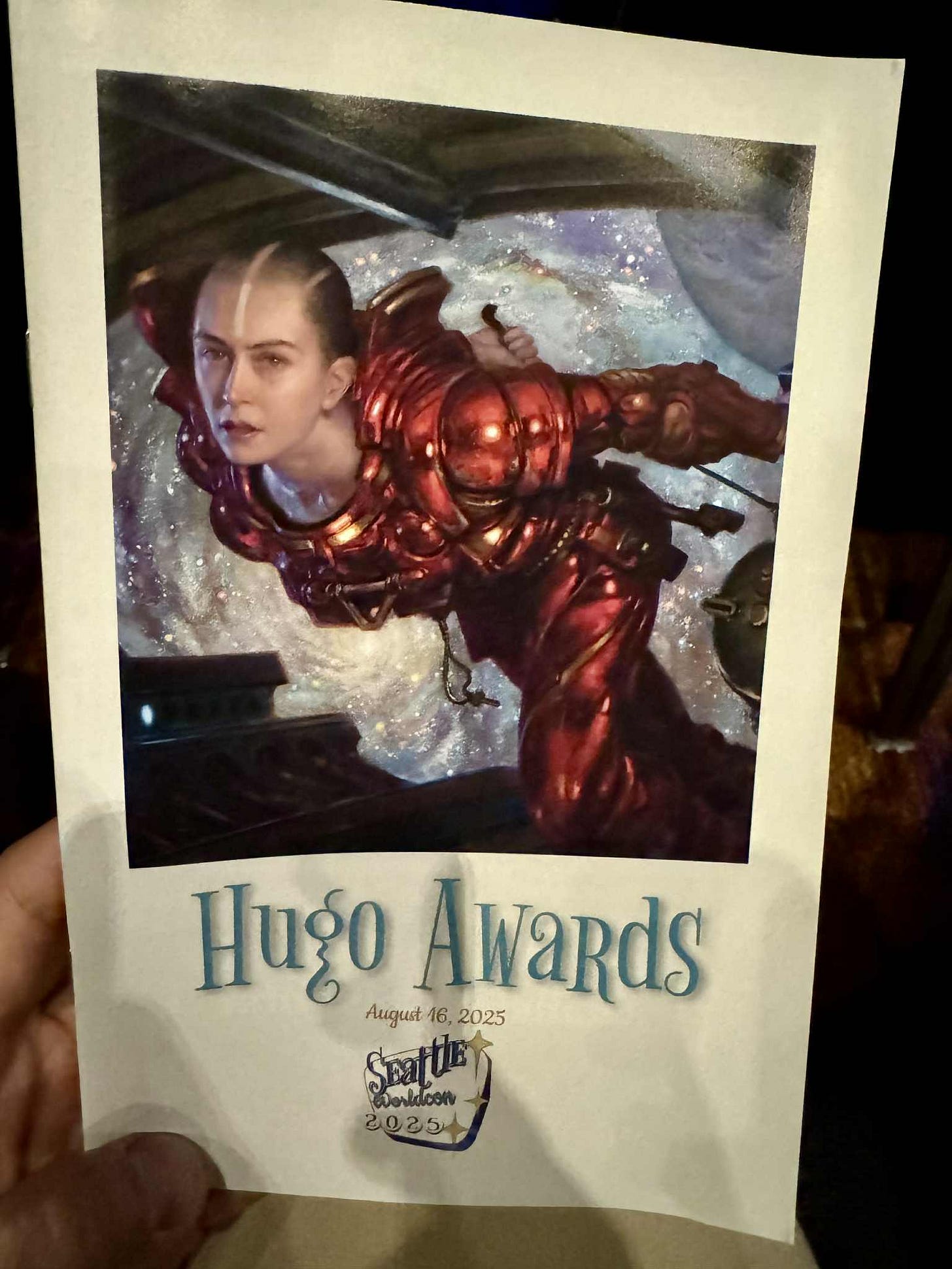
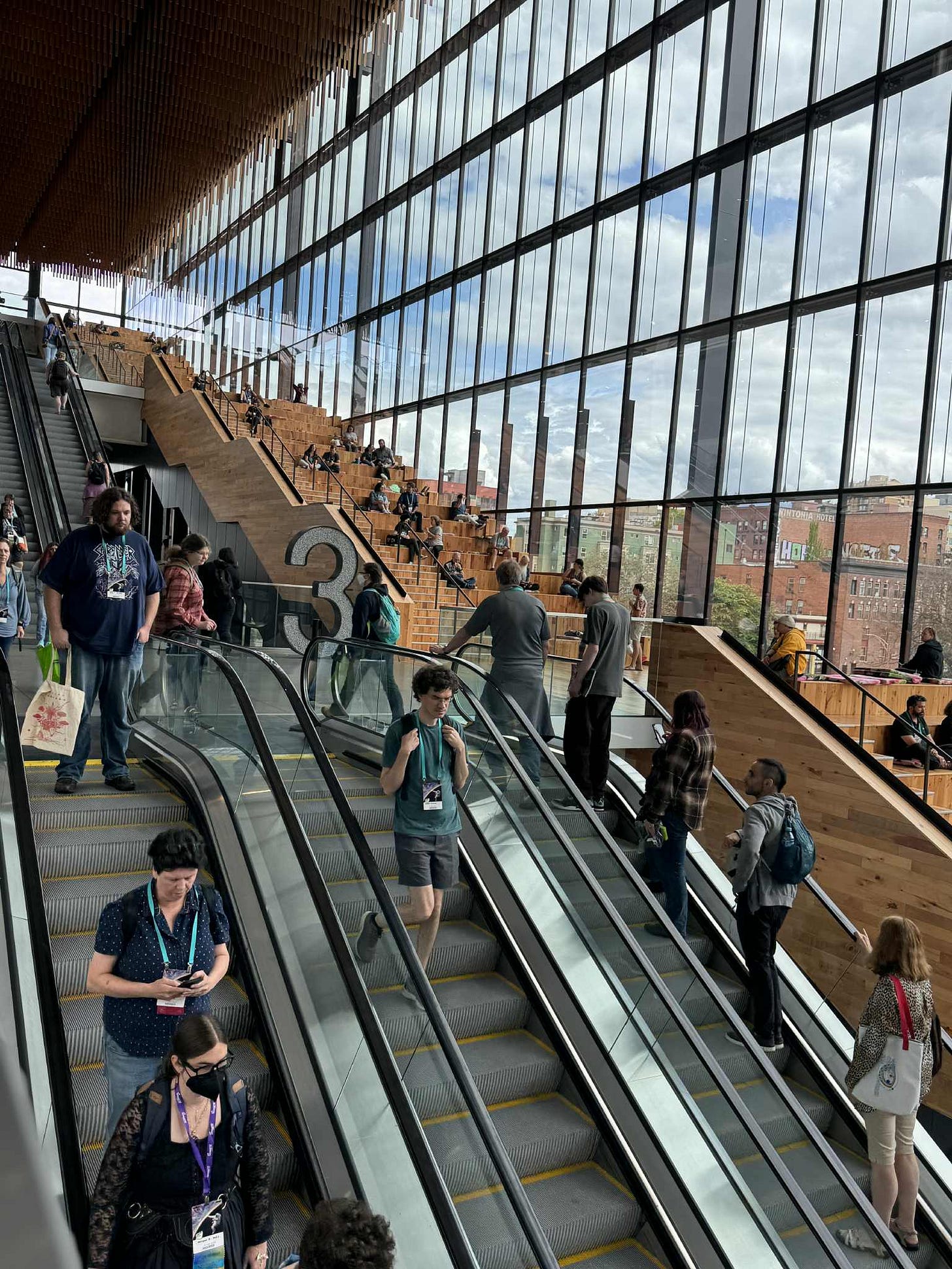
Congrats on a great conference, Michael, and thanks for sharing! You are an inspiration.
Great write up Michael.